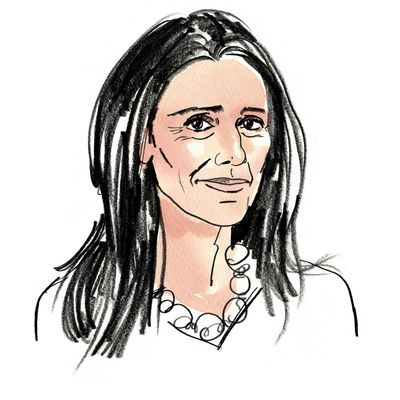
Julie Taymor can still recall the day nearly 30 years ago when she saw M. Butterfly for the first time. She’d heard about “this fabulous new play by this Asian-American wonderful writer” that was based on a snippet of a true story: A French diplomat in 1960s China, ultimately convicted of espionage, had become entwined in an affair with a Beijing opera singer who wasn’t quite who she appeared to be. Taymor thought the playwright, David Henry Hwang, “had a healthy anger — he had something strong to say about how America treats the East and China in particular. I liked it very much, and that was the end of that.”
In the decades after, Taymor became the kind of director who might seem a natural choice to helm a revival of M. Butterfly — and she will this October, when the play returns to Broadway (albeit in a somewhat different form). She’s intensively studied Asian theatrical forms and has long incorporated them into her work, ranging from Mozart’s Magic Flute to The Lion King. Still, Taymor admits, when she was offered the opportunity to direct M. Butterfly, “I wasn’t that interested. Except for classics, I haven’t sought doing revivals.” The play itself “ain’t broke,” and the original production is iconic, as much for BD Wong’s career-making performance as the diva Song Liling as for the late designer Eiko Ishioka’s set, with its gash of a curved red runway slashing across the stage. Eventually, however, Taymor saw what she might bring to it. “The play has always benefited from a very expressive theatricality, and that’s something that immediately comes to mind with Julie,” says Hwang. Taymor is aware that “people assume everything I do will be highly visual to a point. But people who work with me know the first thing I work with is the text. That’s why I love Shakespeare.”
Over the past year, she’s collaborated closely with Hwang on a revision of his play, incorporating details of the original news story that emerged in the years following its publication. “David did base this whole play on a very short news article,” she says. The central duo, diplomat Rene Gallimard and Song, “were symbolic of a relationship, but there wasn’t really a human depth to their relationship. So I said to David: Are you open to my — not my criticism, but my queries?”
For his part, Hwang felt ready to reassess his earlier work and found Taymor an ideal partner. “She tends to pull more toward the intimate personal aspects of the story; I tend to pull more toward the sociopolitical Brechtian aspects,” he says. “She’s incredibly passionate, and I’m a little more chill. I think that dynamic works.” Years ago, Taymor almost collaborated with Hwang on a very different project: “A musical on Leni Riefenstahl,” Taymor recalls. “It’s still a good idea! A real Faustian musical, right?” Her conviction is so palpable that it’s easy to see how the person who convinced Disney execs that puppets and masks could transform The Lion King might sell a musical about a Nazi propagandist. “What’s powerful about Julie is the degree to which she has held on to her avant-garde vision even as she has become one of the most commercially successful directors in history,” Hwang says. “She’s continued to hold on to an auteurist heart.”
Taymor insists she doesn’t see M. Butterfly as some grand homecoming, despite the turmoil around her last Broadway endeavor, 2011’s Spider-Man: Turn Off the Dark (which she has previously called “The Unmentionable”). “I don’t have any feeling about Broadway that way,” she says. “I’ve done too many things in the past six years, including a ton of Lion Kings all over the world.” This fall, she’ll have four productions running in New York: M. Butterfly, her two versions of The Magic Flute up at the Metropolitan Opera, and The Lion King, which 20 years ago made her the first woman to win a Tony for Best Director of a Musical. She’s also at work on a film adaptation of Gloria Steinem’s My Life on the Road, along with a TV series based on Erica Jong’s Fanny. For both, she’d been seeking female writers. “We’re seeing a lot of women in film now who are out there kicking ass,” she says. “And they can really pack a punch and be as tough and fuck-all as the male. That’s good — but there’s plenty of other stories that still haven’t been told.”
*This article appears in the August 21, 2017, issue of New York Magazine.





